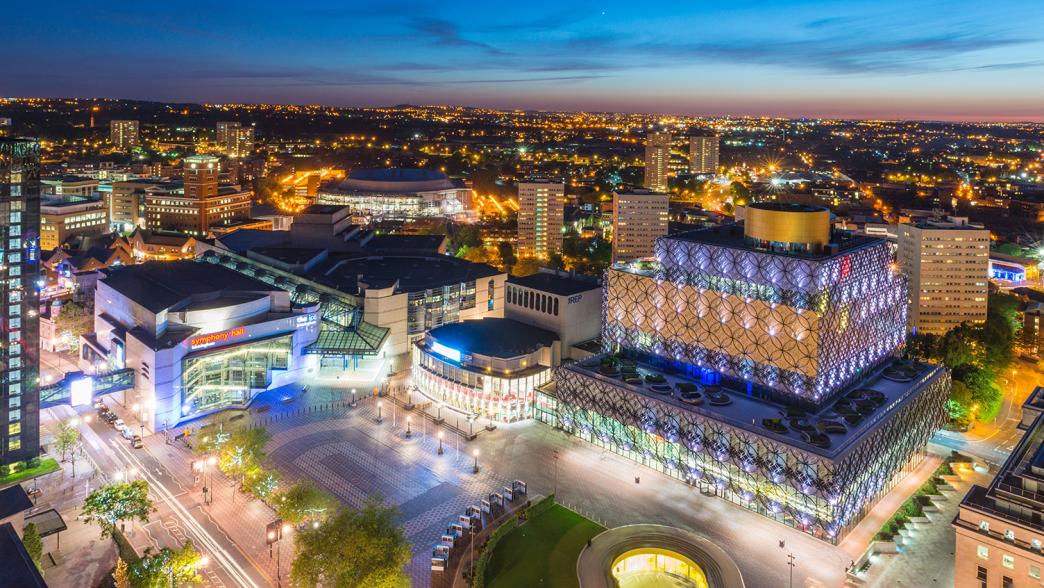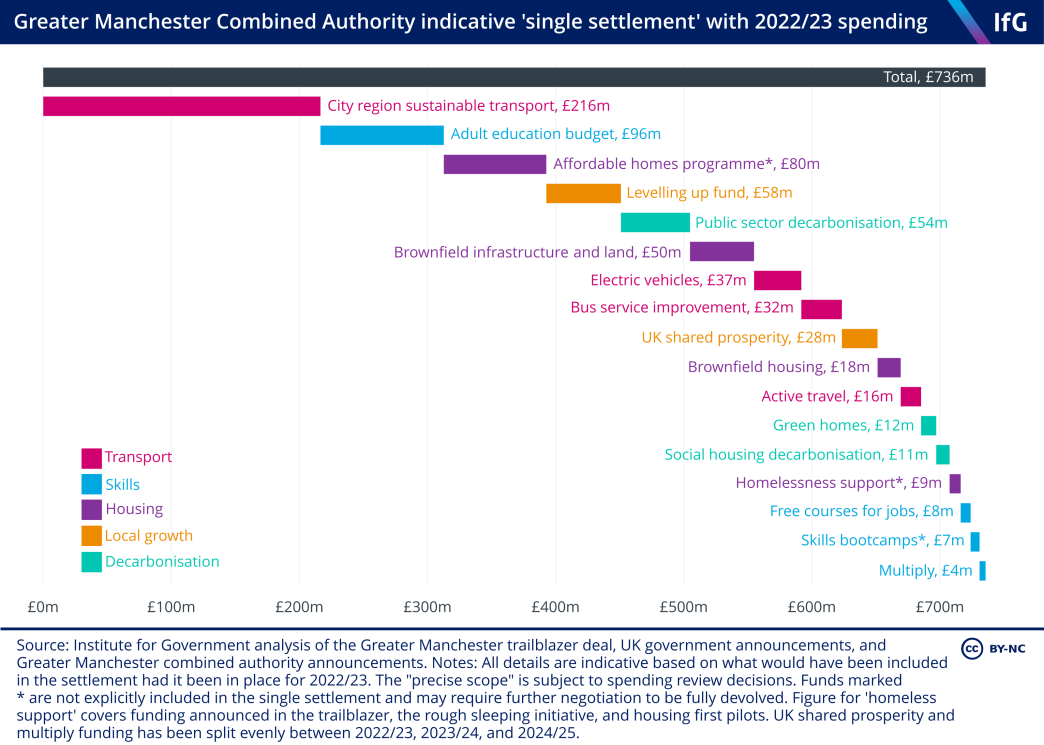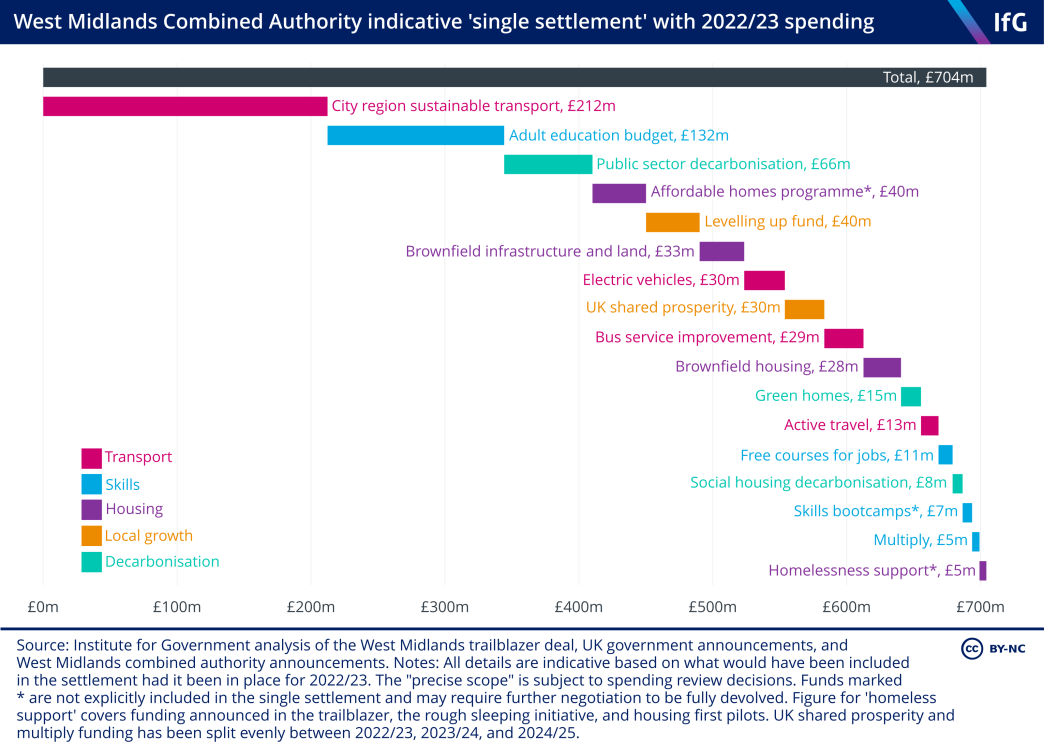Trailblazer devolution deals
What are trailblazer devolution deals and what powers will they devolve to combined authorities?

Additional powers are being devolved to Greater Manchester and the West Midlands following new ‘trailblazer devolution deals’ announced by the government in March 2023.
What are trailblazer devolution deals?
Trailblazer deals involve devolving more powers to mayoral authorities in England and simplifying their funding arrangements. They were first announced in the February 2022 Levelling Up White Paper, when Greater Manchester and the West Midlands were invited to negotiate new deeper devolution deals with the government.
What trailblazer devolution deals have been announced in the 2023 budget?
Following several months of negotiations between Whitehall and local leaders, chancellor Jeremy Hunt announced two ‘trailblazer devolution deals’ for Greater Manchester
17
Department for Levelling Up, Housing and Communities, Greater Manchester Combined Authority: “Trailblazer” deeper devolution deal, 15 March 2023, www.gov.uk/government/publications/greater-manchester-combined-authority-trailblazer-deeper-devolution-deal
and the West Midlands
18
Department for Levelling Up, Housing and Communities, West Midlands Combined Authority: “Trailblazer” deeper devolution deal, 15 March 2023, www.gov.uk/government/publications/west-midlands-combined-authority-trailblazer-deeper-devolution-deal?utm_medium=email&utm_campaign=govuk-notificati…
as part of his budget on 15 March. These deals deepen the powers and reform the funding of the Greater Manchester combined authority (GMCA) and West Midlands combined authority (WMCA).
Hunt announced the deals as part of the government’s mission to “level up wealth generation and opportunity everywhere”. Greater Manchester mayor Andy Burnham said the deal was a “vote of confidence in the way we do things”, while West Midlands mayor Andy Street said it is “doing away with Whitehall micromanagement”.
What new powers do the trailblazer deals devolve to Greater Manchester and the West Midlands?
Greater Manchester and the West Midlands will take on expanded responsibilities in a number of policy areas, including transport, skills, housing, and retrofitting.
Both areas will be given greater influence over local railway services, through new partnerships with Great British Railways. This will enable integration of rail travel with other modes of public transport such as trams and buses, for instance as part of Greater Manchester’s ‘Bee Network’.
WMCA will also take on responsibility for the bus services operators grant, which is already devolved to Greater Manchester.
The trailblazer areas will take on further powers over post-19 skills, building on their existing responsibility for the adult education budget. The new deals will transfer control of other skills funding such as the Free Courses for Jobs programme. There is also a broader commitment to wider post-19 skills devolution, although apprenticeships funding will not be devolved.
GMCA and WMCA will also take on an expanded role in post-16 technical education through joint governance boards in partnership with central government. They will likewise “co-design” future employment support programmes, and become responsible for convening careers guidance.
In addition, the two areas are receiving more housing and regeneration powers, including flexible funding for affordable housing and brownfield land development.
In line with recent Institute for Government recommendations, GMCA and WMCA will take on a greater role in achieving net zero. Both authorities will receive flexible funding to support the retrofitting of properties and improving energy efficiency.

Commuters at a tram stop in Manchester city centre. Greater Manchester and the West Midlands will take on expanded responsibilities in a number of policy areas, including transport, skills, housing, and retrofitting.
How is the funding of GMCA and WMCA being reformed?
As well as deepening their responsibilities, the new deals will change how GMCA and WMCA are funded.
The combined authorities currently rely on a large number of separate funding streams, tied to specific policy areas or projects. This requires them to report separately to multiple Whitehall departments and limits flexibility in how and when they spend their money.
The trailblazer deals state that the current funding system for mayors is “fragmented, overly reliant on centrally administered funds and lacks clear, lean and proportionate accountability structures.” 24 Department for levelling up, housing, and communities, ‘Greater Manchester Combined Authority: “Trailblazer” deeper devolution deal’, p. 16, https://www.gov.uk/government/publications/greater-manchester-combined-authority-trailblazer-deeper-devolution-deal
In recognition of this, the government has agreed to implement a new funding system, in which GMCA and WMCA are treated similarly to government departments. Each combined authority will receive a single funding settlement covering a whole spending review period, reducing reporting requirements and giving local leaders greater long-term certainty and flexibility to reallocate money in line with local needs and priorities.
The deals also commit to using the single funding settlement as the default mechanism for assigning additional funding in devolved areas in future. For instance, if the government decides to create a new adult skills programme in England the assumption is that GMCA and WMCA will simply be given a proportionate slice of the programme budget to spend as they wish.
Details of which funds will be included in the single settlement will be confirmed at the next spending review. However, the new deals include an indicative list of budgets that would have been part of the single settlement if the system already existed. These include the UK Shared Prosperity Fund, the Levelling Up Fund, City Region Sustainable Transport Settlements, funding for buses, the Brownfield Housing Fund, the Adult Education Budget and Free Courses for Jobs funding.
The total amount of funding to be devolved via the single-settlement has not been announced, but our analysis indicates that Greater Manchester would have received at least £736m and the West Midlands £704m had the arrangements been in place for the 2022/23 financial year.


The deal also allows GMCA and WMCA to ‘retain’ all of the business rates levied in their areas for another ten years, continuing pilots first launched in the 2016 budget. However, the government stopped short of giving combined authorities additional revenue-raising powers.
How will the mayors of Greater Manchester and the West Midlands be held to account for how they use their powers?
The new trailblazer deals promised the creation of new committees of local MPs to scrutinise the work of the mayors. These will meet quarterly, possibly in parliament, with the location and the chair to be confirmed in summer 2023.
The trailblazer deals also commit mayors to attending regular ‘Question Time’ sessions to answer questions from the public, and appearing in front of parliamentary select committees when invited.
As previously recommended by the Institute, the deals also commit to giving more resources to mayoral scrutiny and audit committees, including funding to pay members of these bodies.
The deals also require mayors to agree a “streamlined, overarching single accountability mechanism” with government, and to work with central government on agreeing publicly available metrics against which all English devolved institutions can be judged.
These accountability arrangements will build upon the new English devolution accountability framework that was published shortly after the trailblazer deals. 25 https://www.gov.uk/government/publications/english-devolution-accountability-framework/english-devolution-accountability-framework
More details of the specific accountability mechanisms that will be put in place for the trailblazer authorities will be announced following negotiations with government, in advance of the single departmental settlement model coming into operation.
What is the process for implementing the trailblazer deals?
Secondary legislation issued under the Local Democracy, Economic Development and Construction Act 2009 will formally transfer the additional powers to Greater Manchester and the West Midlands.
Before powers are devolved, the combined authorities and their constituent councils must formally ratify the deal. Combined authorities will also be required to undertake a governance review to show additional devolution “would be likely to improve the exercise of statutory functions” and submit the results to DLUHC.
Some aspects of the deal, including paying scrutiny committee members, depend on the Levelling Up and Regeneration Bill passing through parliament. This bill passed the Commons in December 2022 and is now being considered by peers.
As noted above, the new funding settlement will be implemented as part of the next spending review.
Will similar powers be devolved to other parts of England?
Greater Manchester and the West Midlands will have more expansive devolved powers than other combined authorities, but Jeremy Hunt indicated his intention to expand single departmental settlements and business rates retention to all other combined authorities in time.
Similar powers may also be devolved to other parts of England, but this will require negotiations between Whitehall and other combined authorities to agree specifics.
As part of previous negotiations on a geographically expanded devolution deal in the North East, the government has already committed to “commence negotiations on trailblazer provisions which deepen and enhance the powers in this deal in early 2023”. 26 Department of housing, levelling up, and communities, ‘North East devolution deal’, p. 7., https://www.gov.uk/government/publications/north-east-devolution-deal--2
Other local leaders have indicated that they would welcome similar powers. Following the announcement of the trailblazer deals, Steve Rotheram, mayor of the Liverpool City Region, asked for “guarantees from the Chancellor that the Liverpool City Region will be top of the list to next receive these additional powers”.
27
https://www.liverpoolecho.co.uk/news/liverpool-news/metro-mayor-wants-liverpool-city-26487721
It has also been reported that the mayors of West Yorkshire and South Yorkshire will commence negotiations over deeper devolution deals later in 2023.
28
https://www.yorkshirepost.co.uk/news/politics/yorkshire-mayors-to-begin-new-devolution-talks-this-year-4068000
Although likely less expansive than the trailblazer deals, the government also remains committed to agreeing devolution deals with “every part of England that wants one” by 2030.
- Topic
- Devolution
- Position
- Metro mayor
- English Regions
- North West West Midlands
- Combined authorities
- Greater Manchester Combined Authority West Midlands Combined Authority
- Publisher
- Institute for Government